
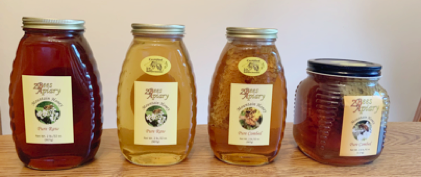
ZBees liquid gold... fresh from the colonies!

Lifetime member of the North Carolina Beekeepers Association
The Apiary... Manage it well!
Beekeeping is a tenacious undertaking, and it is not for the “faint of heart,” meaning: If you do not take the time to properly manage your apiary, then it is most likely doomed to fail. If you are a complacent individual, then you may want to bypass the practice of Beekeeping!
Let me say it this manner:
Beekeeping is fun… until you get stung,
And then… you must find a reason,
To stay in the hive… and continue to strive,
From season… to season… to season (dpz, 2021).
Even under the best of conditions, where the beekeeper (beek) performs proper apiary management practices, the beek may lose a few- if not all- of the hives in the apiary. Nature has a way of taking care of its own, however, it also has a way of destroying its own too. As such, beeks must be diligent and vigilant in their desire to manage honeybee colonies. Every apiary is different, with respect to location, size, availability of nectar and pollen, or in the management style of how the beek preserves their colonies. Nevertheless, certain standards must exist for the apiary to remain healthy and grow.
- First, keep yourself updated about bees and beekeeping practices.
- Second, use your experience to teach others about honeybees.
- Third, beekeeping is a “science, not a hobby,” for bees need nurturing to develop.
My brother termed it best when he stated, “There are beekeepers and there are people who just keep bees” (Mike Zachary, Sept. 2016). Beeks must manages their apiary on a regular basis to ensure the bees are thriving for the good of the colony, environment, and the beekeeper. The “person who just keeps bees,” typically; fails to plan for proper apiary health and expansion. Sustainable Hive Management (SPM), Integrated Pest Management (IPM) practices should compel beekeepers to practice proper hive management and inspections of the apiary.
The first year as a “beekeeper” teaches us some valuable lessons in managing honeybees, because the primary concern is nurturing these pollinators and honey producers who help the environment and the food economy. Keep watch over your bees and the number of hives will grow exponentially as the health of the whole colony improves. Practice good producing queen controls for greater hive expansion. Thus, a properly managed apiary can reduce stress on the bees and the beek alike. When questions arise, experienced beekeepers can help with many issues so, quiz them and learn.
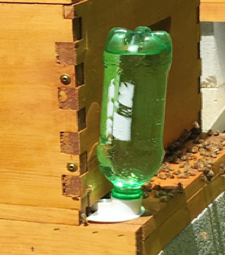
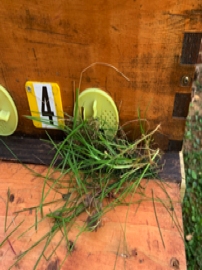
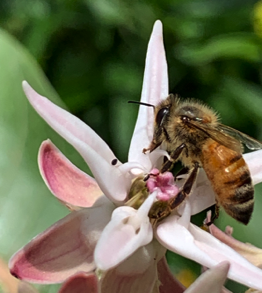
Water at the hive for the bees
Italian honey bee on lily
Setting up a new hive - grass is placed at the entrance so the bees will orient themselves to this hive box.
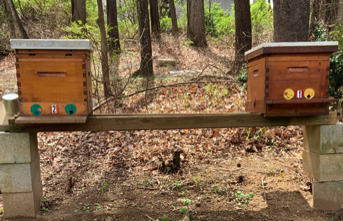
Every apiary is different and every beek has their own management style of maintaining their honeybees. The difference between a successful apiary and one with multiple "deadouts" is often the beek's fault and not the bees. Let me explain. If you are someone... "who just keeps bees," then you have already placed the bees in a condition of colony collapse or apiary failure. Beeks who ignore the warning signs of apiary behavior often fail to take the appropriate action(s) and they will learn just how devastating nature can be to any particular colony. The essence of any endeavor concerning "live creatures" is to stay involved with them.
Example:
If you are a pet owner, then try letting your dog, cat, or bird feed themselves. Without your direct involvement they will soon turn to their natural instinct for survival. They will let you know by their voice (howling, meowing, squawking) or actions (clawing, pacing, scratching, urination, etc.) that they need your immediate attention.
Honeybees are different, they just leave the hive box when improperly attended.
Remember, every apiary is different and every beek has their own management style of maintaining their honey bees. The difference between a successful apiary and one with multiple "deadouts" is often the beek's fault and not the bees. Let me explain. If you are someone... "who just keeps bees," then you have already placed the them in a condition of colony or apiary failure. It is known as Colony Collapse Disorder (CCD) and affects every beekeeper to a certain extent. Beeks who ignore the warning signs of CCD often fail to take the appropriate action(s) and they soon learn just how devastating nature can be to the bottom line. What is the bottom line you may wonder? The bottom line is the demise of your apiary in terms of:
Langstroth beehives with telescoping roof
Considerations About Beekeeping
- colonies “dead outs” or "absconsion", due to lack of proper apiary management.
- loss of money, equipment, and time you have invested.
- the reduction of crops which depend on honeybees for pollination.
The essence of any endeavor concerning "live creatures" is to stay involved with them. Unlike house pets, honeybees do not need the same type of care that pets require. However, they will let the beek know that they are displeased with their living conditions. They will swarm when the hive box becomes overcrowded and leave the apiary to find a new home. They may die inside the hive, from lack of proper attention and treatment, especially during winter months.
My brother (also a beekeeper) coined the phrase, “There are beekeepers and there are people who just keep bees,” and that statement carries over to include other areas of life too. Consider these phrases, "There are parents and there are people who just have kids,” or "There are pet owners and there are people who just keep pets.” In these three scenarios there is a common denominator which separates beekeepers, parents, or pet owners from all the others. That denominator is "nurturing and managing" that which you care about deeply. Ignore the waring signs and shrug off the required actions needed to maintain a healthy apiary, home, or pet ownership and you will fail. Most importantly, that which you are entrusted to care for will either leave or die.
Beekeeping is not for the person who gives up easily or fails to maintain the proper attitude about caring for "living" entities, but then, so is parenting and pet ownership. Remember, a healthy apiary or home requires our much needed attention in order for that which we deeply care about to thrive and continue in life's cycle.
Installing the First Packages of Honey Bees